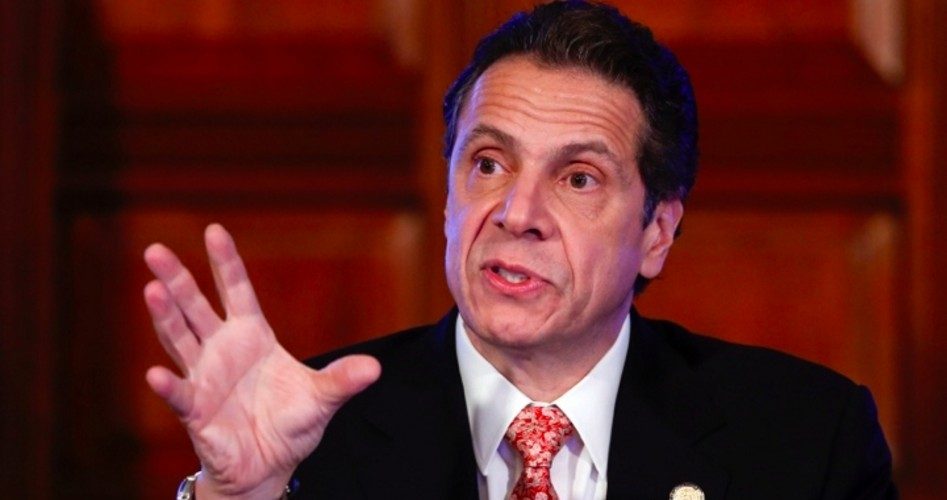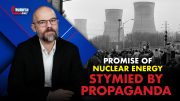
New York State Governor Andrew Cuomo (shown) announced Wednesday that his administration would ban fracking — hydraulic fracturing — in his state due to concerns that the process might result in some health risks to the public. In his announcement he tried to deflect responsibility for the decision onto his “experts” who had drafted a 184-page report, A Public Health Review of High Volume Hydraulic Fracturing for Shale Gas Development, claiming:
I am not a scientist. I’m not an environmental expert. I’m not a health expert. I’m a lawyer. I’m not a doctor. I’m not an environmentalist. I’m not a scientist.
So let’s bring the emotion down and let’s ask the qualified experts what their opinion is.
He didn’t mention that he’s also a longtime politician who is still reeling from a surprisingly contentious re-election campaign in which a far-left anti-fracker took about a third of the primary vote. This served as a finger-in-the-air indicator that any previously announced intentions to lift the state’s six-year-long temporary ban on fracking would risk alienating his liberal environmentalist supporters. As recently as June 2012 Cuomo said he was considering lifting the ban, but his frighteningly close brush with political oblivion coupled with the release of the report allowed him to make the fracking ban permanent.
Cuomo’s state health commissioner was happy to accept the responsibility for the decision. In his introduction to the report Howard Zucker noted that
[it] required an evaluation of emerging scientific information on environmental public health and community health effects. This also required an analysis of whether such information was sufficient to determine the extent of potential public health impacts of HVHF (high volume hydraulic fracking) activities in New York.
The report summarized several dozen other studies, reports, and opinions on the matter from sources ranging from professors at Cornell University to writers at the Washington Post to bureaucrats at the EPA, and even then the certainty of negative impacts on public health was doubtful. But he plowed ahead nevertheless:
Absolute scientific certainty regarding … the impacts of HVHF on public health is unlikely to ever be attained.
In this instance, however, the overall weight of the evidence from the cumulative body of information contained in this Public Health Review demonstrates that there are significant uncertainties about the kinds of adverse health outcomes that may be associated with HVHF….
Until the science provides sufficient information to determine the level of risk to public health from HVHF to all New Yorkers and whether the risks can be adequately managed, [my department] recommends that HVHF should not proceed in New York State.
Reaction from pro-fracking interests was immediate. Karen Moreau, the executive director of the New York State Petroleum Council, charged that Cuomo’s decision was political, “that he wanted to align himself with the left.” His decision left those living above the immense Marcellus shale formation (which stretches from New York into Ohio, Pennsylvania, and West Virginia) cut off from any opportunity to reap the economic benefits of fracking:
Our citizens in the Southern Tier have had to watch their neighbors and friends across the border in Pennsylvania thriving economically. It’s like they were a kid in a candy store window, looking through the window, and not able to touch the opportunity.
Reid Porter, writing for the American Petroleum Institute, claimed that Cuomo acted “irresponsibly” and that economic opportunity, the potential for new jobs, and badly needed revenue all were shoved aside in his quest to appease the anti-frackers:
Today’s action by Governor Cuomo shows that New York families, teachers, roads and good-paying jobs have lost out to political gamesmanship.
Besides, said Porter, existing regulations at both the state and federal levels were more than sufficient to protect public health, just like in other nearby states such as Pennsylvania and Ohio that are enjoying the fruits of the fracking revolution. Since that revolution began, Pennsylvania has benefited from more than $2 billion in state and local tax revenues that, according to Porter, have “supported road and bridge improvements, water and sewer projects, local housing initiatives, environmental programs and [the] rehabilitations of greenways.”
Nationally it’s too soon to tell what impact Cuomo’s decision will have on anti-fracking efforts elsewhere. National Geographic happily observed that some anti-fracking initiatives had passed last month, notably in Denton, Texas, Athens (in Ohio), and the northern California counties of San Benito and Mendocino. However, in Colorado, bans in Fort Collins and Longmont were overturned in rulings that held that the state had primary regulatory authority over all oil and gas operations.
Despite a two-year study that reviewed dozens of opinions and yet was unable to come up with any hard proof that fracking endangered public health, New York State Governor Andrew Cuomo decided to burnish his credentials with the anti-fracking Left. Those credentials might just come in handy if Hillary Clinton loses in 2016, opening the door to Cuomo for a run in 2020.
Photo of Gov. Andrew Cuomo: AP Images
A graduate of an Ivy League school and a former investment advisor, Bob is a regular contributor to The New American magazine and blogs frequently at www.LightFromTheRight.com, primarily on economics and politics. He can be reached at [email protected]



